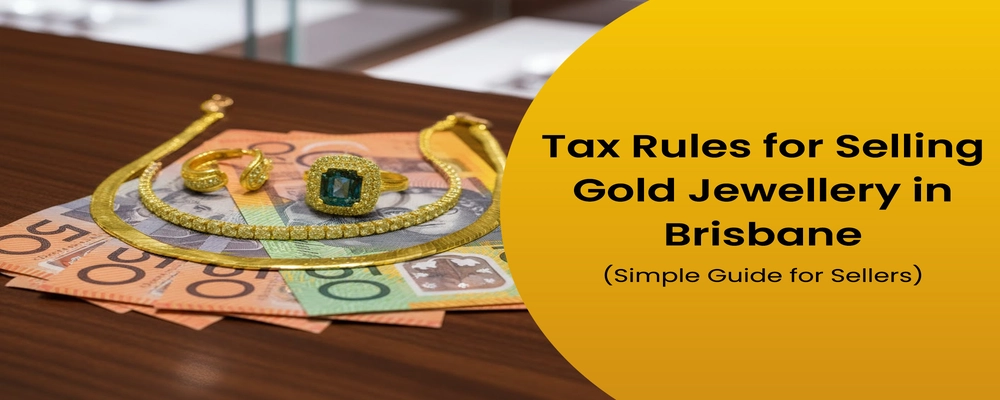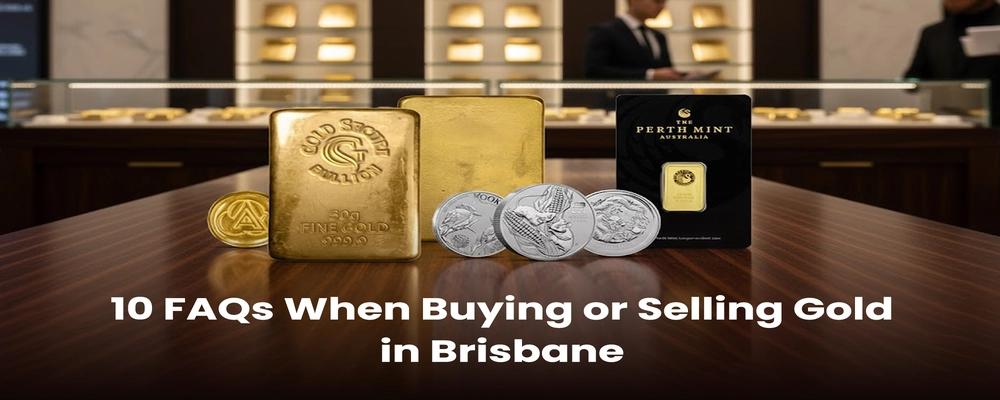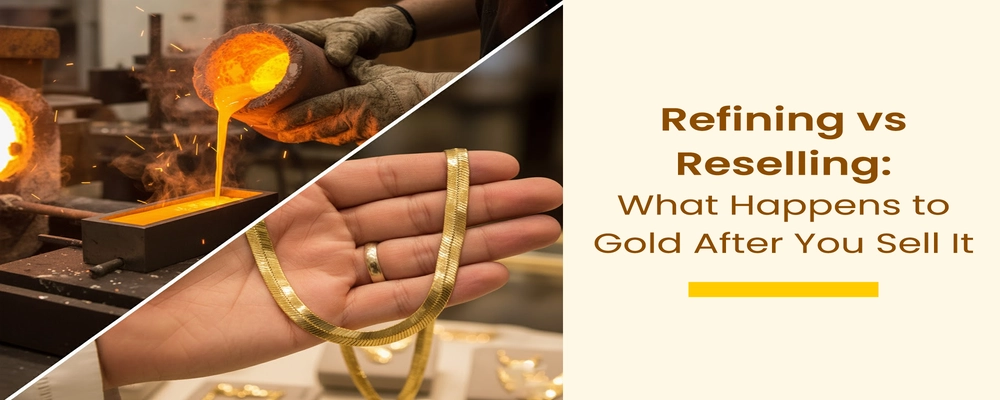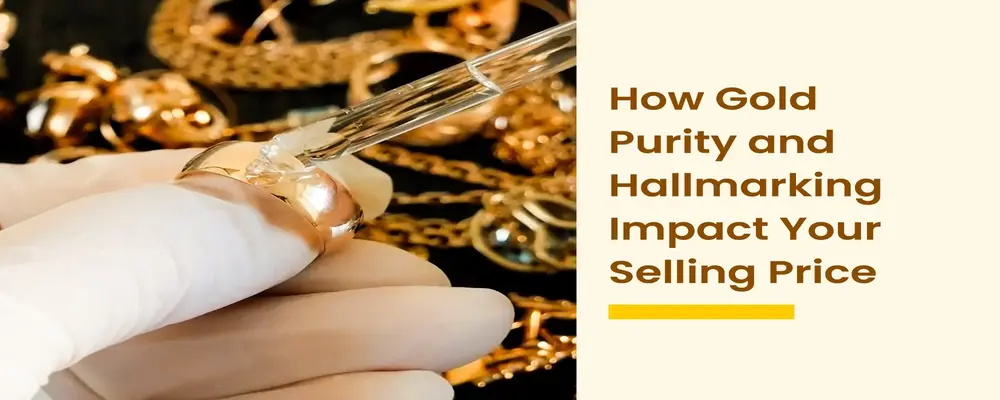Are you planning to sell gold jewellery in Brisbane? It’s important to understand how taxation laws can impact the cash you receive. Below is our all-inclusive guide that outlines GST, Capital Gains Tax (CGT), and what the ATO considers with real-life examples, so you can understand how it works.
Read on.
Quick Synopsis
-
- Jewellery items are treated separately from investment bullion for taxation purposes.
- GST (10%) typically applies to jewellery but not to investment-grade bullion or eligible coins.
- CGT might apply to profits in certain sales, but run-of-the-mill jewellery sales are exempt from tax under the ATO’s “personal use asset” rules (this is explained in detail below).
- Keep store receipts and records, as they matter. The ATO considers the purchase price, when you purchased it, and why you purchased it when deciding on tax treatment.
1) GST — will I have to pay it when I sell jewellery?
-
- Yes. Jewellery (and other non-investment gold products) typically charge GST. The GST tax was typically paid when the item was purchased and might have an impact on the price chain. The ATO and Australian rulings exempt investment-grade gold (high-purity bullion and some mint coins) from GST as these products are typically GST-free if they meet the ATO’s fineness and form requirements.
What this means to you: If your item is a gold ring, necklace, or most jewellery, it’s not considered “investment bullion”, meaning that GST applies to the retail sale. For bullion (bars) or minted investment coins, GST would not normally apply.
2) Capital Gains Tax (CGT) — when might I pay tax?
-
- CGT is all about profit. If you sell an asset for more than you originally paid for it, you might have a capital gain, and that gain may be taxable. The ATO rules for CGT apply to most types of assets, such as jewellery, except where it’s considered a personal use asset.
- Personal use asset rule: The ATO considers several assets held predominantly for private use (e.g., most jewellery worn for private enjoyment) to be personal use assets. Unless the initial cost was A$10,000 or less, capital gains on such assets are not subject to CGT. Where the item costs more than A$10,000, you might have to pay CGT when you sell.
- Holding period discount (50%): If the asset in question is subject to CGT and is held for 12 months or more, then persons may qualify for a 50% CGT discount on the capital gain. That can minimize the taxable amount if CGT does apply.
- CGT is all about profit. If you sell an asset for more than you originally paid for it, you might have a capital gain, and that gain may be taxable. The ATO rules for CGT apply to most types of assets, such as jewellery, except where it’s considered a personal use asset.
Practical examples
-
- Example A — Second-hand wedding ring purchased for $2,000: Presumably a personal use asset and under the A$10,000 threshold → no CGT when sold.
- Example B — Collectible investment coin purchased as an investment for A$8,000 and later sold for A$10,000: If it’s an investment coin (satisfies ATO’s bullion/coin rules), GST won’t apply, but CGT might apply on the A$2,000 profit (other exemptions might apply).
- Example C — Necklace purchased for A$20,000 years ago and sold for A$30,000: Cost > A$10,000, so personal use exemption will not apply — CGT could be payable on the profit (potential 50% reduction if owned >12 months).
3) What the ATO looks at (and what you should keep)
When the ATO or your tax consultant considers whether there is tax on selling gold in Australia, they examine:
-
- What it is (jewellery versus investment bullion/coin).
- Why did you hold it (personal use vs investment)?
- Purchase price and date (your cost base) and sale price (capital proceeds). Keep receipts, invoices, and bank records.
4) Jewellery vs Investment Bullion
| Question | Jewellery | Investment Bullion / Eligible Coins |
| GST (10%)? | Usually yes | Usually no (if investment-grade) Australian Taxation Office+1 |
| CGT? | Possibly (personal use rules may exempt some items costing ≤$10k). Australian Taxation Office | Possibly — depends on holding and whether it’s an investment asset; gains are reported if applicable. Australian Taxation Office |
| Best when selling for cash | Local buyer for jewellery (Cash Your Gold) | Bullion markets or dealers; Cash Your Gold buys bullion too |
| Records to keep | Receipt, valuation | Purchase invoice, mint certificate, holding proof |
5) Selling through Cash Your Gold
-
- We’re a licensed second-hand dealer and gold buyers in Brisbane. We record transactions as required by law. When you visit us to buy or sell gold, you’ll need appropriate photo ID for the sale. These safety practices, as mandated by the law, keep our customers and us safe. (Click here to check our ID requirements on the site)
- We value your jewellery and bullion differently. We employ XRF analysis and live market prices to determine the purity and weight of your gold. This helps you to clearly understand how the final offer is made. Keep your purchase documents safe, as they might prove useful if tax questions ever come up.
- We provide payment either in cash or via same-day bank transfer, and we’ll issue a clear receipt along with all necessary documentation for your records.
Points To Consider Before You Sell Your Gold
-
- If your jewellery was worth less than $10,000, it’s likely a personal use asset and generally exempt from CGT. Keep the receipt as a precaution.
- If you possess bullion or government-issued investment coins, they are typically GST-free, offering a tax benefit to investors. Check purity and documentation.
- If you were profitable and aren’t certain of the profit value, keep the sale documents and consult a tax agent—CGT regulations can be specific to your circumstances. The ATO’s CGT guides and myTax guidelines describe how to report gains.
Looking for a free valuation or to know more about the tax documents? Visit our Chermside, Sunnybank, or Browns Plains store, call 1300 67 8175, or request our mail-in pack online.
Frequently Asked Questions (FAQs)
Q: Do I need to report if I sell a gold ring?
A: In most cases, you won’t need to report it if it’s a personal-use item purchased for $10,000 or less. If you’re unsure, it’s a good idea to keep your records and seek professional advice.
Q: Are gold bars taxable?
A: Investment-grade gold bars and eligible coins are usually GST-free, but CGT can apply if you sell profitably.
Q: What documents should I present when selling?
A: Bring identification, any payment or buying invoices, and mint certificates if you have them. Cash Your Gold will issue a written valuation and receipt so you can sell gold in Brisbane seamlessly.




